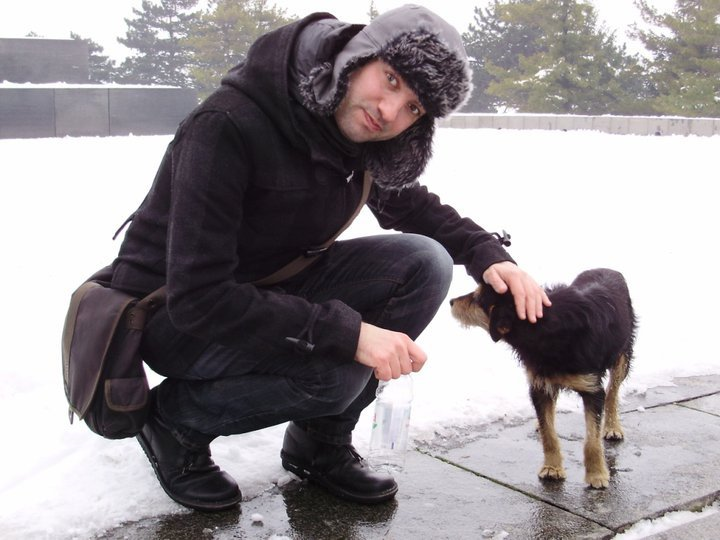Interview with: Božidar Cvetković, UEPS jury member: technology is like fire: great assistant but dangerous master

As the year enters its final part and the impressions from the UEPS awards ceremony are slowly settling down, we continue to have small conversations with this year's jury members. Today, Bozidar Cvetkovic, Creative Director of FCB Afirma, is with us.
A media campaign called 'Acceptance' created for the Ministry of Education, Science and Technology's Inclusive Preschool Education Project to promote the development of an inclusive society and encourage the kindergarten enrollment of children from sensitive groups. Billboards have been set up across Serbia where we can see our children and their sincere smiles. Do you believe that parents will change their minds after this if we start from the fact that they are the ones the children look up to?
Even the longest journey begins with the first step. If we don't even try to change the awareness of the importance of accepting diversity, especially in adults (because children do not discriminate against other children unless taught to do so by their parents), and present kind treatment of others, especially the weakest, as something natural, a completely normal, everyday thing, we will not make this community a community worthy of respect, not so much by others as by ourselves.
These campaigns are at the same time the most difficult and the most beautiful. They are difficult because the topics are as big as life itself, so the responsibility is extraordinary, and most beautiful because they always come from the heart and fill you with special warmth. I would like to avoid the commonplaces and try not to slip into pathos, but after campaigns like this, I believe that one grows a little bit in human terms, that that childlike purity enriches you and makes you a better person.
Living in an age where technology connects us with thousands of people and at the same time distance us from them, reducing our sense of connectedness and closeness, how much do you think marketing executives and the communications industry understand that branding needs emotional communication?
Judging by this year's cross-section of the state of our profession, emotions have not receded in the face of technology, but are most comfortably placed in the campaigns of technology companies. And when you are part of a global network (FCB Afirma is the regional headquarters of one of the oldest marketing groups in the world that has been in real creative momentum in recent years), you have an insight into the latest creative processes and achievements in this business, so I can freely claim that it is a global trend to keep emotions at the heart of most exciting advertising stories.
This is because it is clear that without emotion there is no real life. Without them, we are just empty shells, merely shadows of ourselves. In all the negative utopias, "dehumanization" is the path to absolute tyranny.
Of course, I would be foolishly light-hearted if I said that there was nothing good about machines. In some ways, technology is like fire: a great helper, but a dangerous master.
Is creativity God-given talent or is it a thing to be learned?
Every talent can be wasted if one believes it's enough to be talented. There is no progress without commitment, whether it is a commitment to learning or to gain new experience. Although in modern times we are used to shortcuts, I think the rule is still that there is no progress without challenges. This is an era of illusion of endless knowledge (because everything is within reach), a time of unsettling superficiality, and ease. If our world survives, it will survive thanks to new inspiration, new creativity.
Is technology the one that kills it?
Only if we confuse it with Aladdin's magic lamp. Creativity is not a button, it is a serious and, most often, a very time consuming process, so as long as one is at the center of it, technology will only be a valuable helper. As long as we don't sell our souls to machines (and the dangers aren't quite harmless when it comes to this metamodern Faust), I don't think creativity is compromised. The most important thing is that we have no dilemmas in this human-machine dichotomy - if we do not doubt the core of creativity and where it comes from, we will have no trouble saving it from various temptations. Otherwise, if we don't believe it ourselves, then, of course, our technology, like some mythical monster, will eat us up for breakfast.
UEPS has been bringing together agencies, advertisers and the media for half a century. How important do you think the existence of such an association is?
It is extremely important. At a time when the attention of the average person is reduced to the focus of a goldfish, something that has existed for more than half a century deserves deep respect. Tradition is less and less understood as blind acceptance of the inherited, but as a reflection on the values of past times in contemporary context. UEPS will live because it is ready to change, to follow the spirit of the times but also to influence it. UEPS is a significant mirror to our marketing world, a clear reflection of what we really are in a professional sense.


